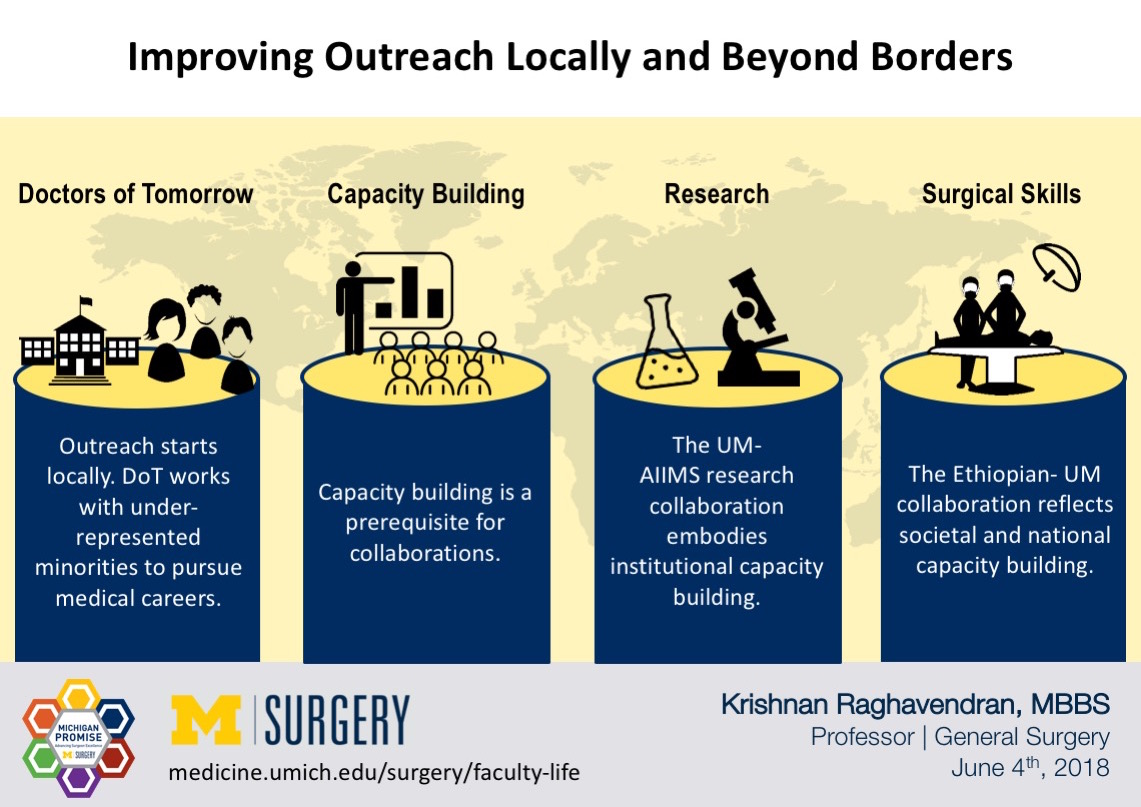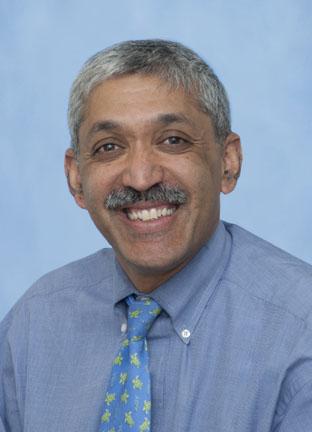
For many years, surgery was not a primary focus in the field of global health. There were many reasons for this, not limited to the fact that, until recently, infectious diseases such as malaria, tuberculosis, and HIV contributed to the largest burden of disease worldwide, and thus, dominated the global health agenda. In the wake of a rising burden of disease attributable to non-communicable diseases, initiatives by the Lancet Commission of Surgery, and expansion of ACGME guidelines to accommodate international rotations, we believe it is the right time for us to invest in global surgery within the Department of Surgery. With the Michigan Promise, we are building outreach efforts locally and across national borders that are aimed at reducing inequalities in health due to variances in access to basic surgical care across the world.
Start Locally: The Doctors of Tomorrow Program
Outreach starts locally. Doctors of Tomorrow (DoT) is a partnership between Cass Technical High School in Detroit and the University of Michigan Medical School. The program was started by Jonathan Finks, M.D. The goal of the program is to inspire and empower under-represented students to pursue careers in medicine as a means of increasing the diversity of the physician workforce. DoT works with thirty-five ninth grade students each year in a program that combines mentorship, clinical enrichment, academic preparation, and professional development. Participants come to the medical school campus for monthly activities that include clinical skills development, physician shadowing, and activities in the anatomy lab and clinical simulation center, among others. Each DoT student is paired with a medical student mentor whom they meet during the monthly visits. The mentors serve as a resource in between visits as well. The students also break into groups to work on Capstone Projects designed to address public health problems in their community. The projects help develop critical thinking skills and teach students to become agents of change. Competitive summer internships in basic science labs and community service organizations are available for students who have completed the 9th grade curriculum. Graduates may also participate in DoT Rising, a program for 10th through 12th grade students that focuses on professional development and college readiness. For DoT students who attend college at the University of Michigan, the DoT Succeed Program focuses on clinical experiences, mentorship and academic success. Competitive scholarships are available for these students as well to help offset the costs of school supplies and other academic needs.
Looking toward the future, the focus is on disseminating the DoT model through publications and presentations at national meetings. We are also developing a toolkit to allow other medical schools to replicate the curriculum. Programs like this can be run on very limited budget, as they rely most heavily on gaining program participants at the faculty, medical student, and high school student levels. Through replication of DoT on a national scale, we hope to move the needle on diversifying the physician workforce in the United States.

Expand Internationally: The Michigan Center for Global Surgery
Global surgery represents a critical extension of academia as a branch that consistently garners attention from medical students and residents alike. We believe that research institutions like ours have a critical role to play in the setting of global science projects that are fully integrated in the various faculty initiatives to prepare trainees for the future. Surgical residents and medical students from the University of Michigan spend a month at the Apex Trauma Center or at St. Paul’s Millennium Hospital working with local surgeons who practice in a resource-limited environment. These learners understand at first hand the magnitude of health burden in a developing country. These different scientific collaborative initiatives with our partner institutes not only have the potential to advance care of the underprivileged but also have the potential to discover new scientific findings. We believe that these goals of adopting quality, high throughput technologies could translate science into practice and reinvigorate science to work for the benefit of healthcare. We established the Michigan Center for Global Surgery with a mission focused on reducing inequalities in health due to variances in access to basic surgical care.
Capacity Building
Capacity building is an essential prerequisite for successful collaborations across the developing world. Capacity building is often defined as a conceptual approach to development focused on understanding the various obstacles that prevent realization of specific goals while enhancing the capabilities to achieve sustainable results. It has been defined across multiple strata including individual, organizational, institutional and national settings. Building research capacity, particularly in the developing world, involves certain key elements.
Prominent aspects include:
- Mentoring clinicians and scientists,
- Accessing resources including scientific journals, databases and services of a health service librarian,
- Building a research culture in which people actively discuss and think about research and see it as part of their daily professional lives,
- Engaging external collaborators in research initiatives; confidence building and encouragement are critical elements for long-term success.
Capacity Building in Research
An example of capacity building at the institutional level is reflected by the University of Michigan - All India Institutes of Medical Sciences (UM-AIIMS) collaborative that began in 2010. A week long, intensive course in research methods was undertaken as part of the UM-AIIMS collaboration. The course was designed to build bi-directional opportunities for research between the two institutions and countries. The course addressed a stated need at AIIMS for a formal, structured experience that would assist junior faculty in developing best practices for translational and clinical research. The goals of the course were achieved by a combination of didactic and small group sessions, applied to both clinical outcomes and translational research. Junior faculty members from AIIMS and other institutions participated. They were asked to develop and refine five-page grant projects using group mentoring and feedback sessions. The sessions also focused on methods to develop and justify feasible scientific questions pertaining to human subject research. Ten successful concept ideas were initiated across multiple disciplines and then developed into full proposals with mentorship from both the institutions. To date, 5 such courses have been held at AIIMS, and 145 junior faculty members have been trained. As a result of these exchanges, the collaborative was able to obtain joint funding from the National Institutes of Health (NIH) though the US-India Collaborative Award examining the use of ultrasound to measure optic nerve sheath diameter as a surrogate marker of intracranial pressure elevation in traumatic brain injury (TBI). Multiple abstracts, oral presentations and manuscripts have been completed that reflect important metrics of success. The awards from NIH and government of India further strengthened the research coordination center at AIIMS by enabling employment of research staff.

Capacity Building and Imparting Surgical Techniques
Capacity building at societal and national level is reflected by the collaboration between the ministry of health in Ethiopia and the transplant team at the University of Michigan. Tens of thousands of Ethiopians were dying of kidney failure each year, and there were no available options within the country. Dr. Jeffrey Punch, M.D., a transplant surgeon at the UM Transplant Center, took this challenge and decided to launch a team that involved bringing together a multi-disciplinary medical, surgical, and nursing team to provide renal transplantation. The team has been continuously involved in training Ethiopian surgeons and together performed over 80 kidney transplants in Ethiopia to date. Kidney transplantation was a procedure that had previously been unavailable anywhere in Ethiopia. Kidney transplantation, particularly in a resource-limited environment, has been shown to be more cost-effective compared to regular hemodialysis and the experience of Punch and his team has shown that outcome can be excellent.
These programs provide a unique opportunity to create a sustainable pathway for residents and faculty members to shape the future by strengthening surgical systems around the globe. The consolidation of all global surgical activities under one umbrella has the potential to solidify the importance that the Department of Surgery places on its global mission. This further will enable us to attract the best resident and faculty member and serve as a recruiting tool in the near future.
Article by Krishnan Raghavendran, MBBS

Krishnan Raghavendran, MBBS
Contact Us
Reach out to join the conversation or to learn more about how to implement the Michigan Promise. Connect with the Department of Surgery or our faculty on Twitter to share your ideas or get in touch with the Office of Faculty & Resident Life to schedule a Michigan Promise presentation at your institution. You can also fill out our Michigan Promise Inquiry Form with any questions or comments.
Department of Surgery
2210F Taubman Center
1500 E. Medical Center Dr.
Ann Arbor, MI 48109
Phone: 734-232-5528
Email: [email protected]
Twitter: @UMichSurgery
Hashtag: #MichiganPromise

